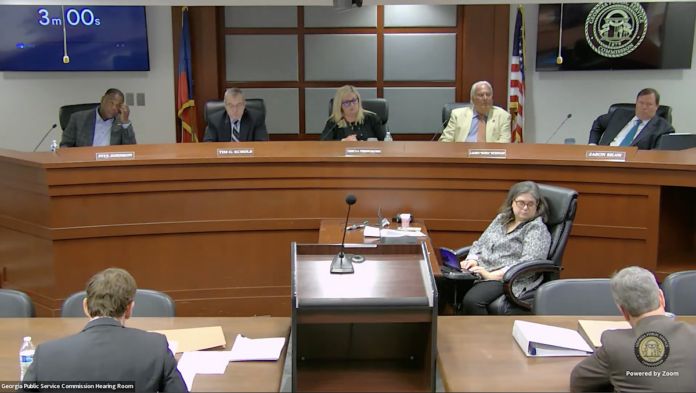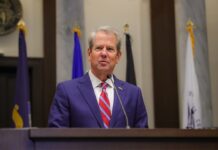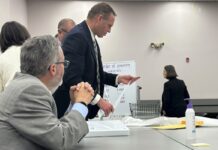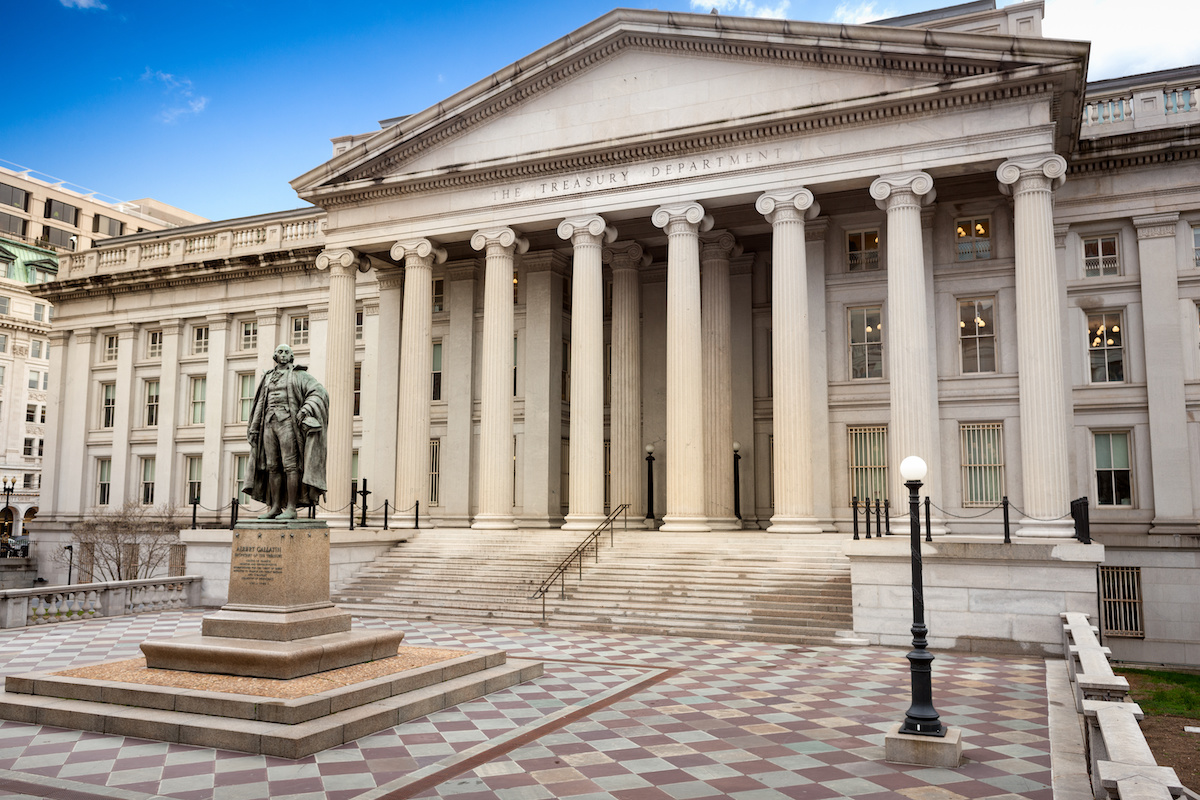
(Georgia Recorder) — A Georgia environmental organization is pushing against plans to postpone state utility regulator elections until 2025, arguing that further delay denies the rights of several million Georgia Power customers to elect members to a board that has approved several company proposals that have increased the financial burden on ratepayers.
A former state Public Service Commission candidate and a Georgia Conservation Voters representative both said they are concerned that a pending case is being used as an excuse by the secretary of state to cancel elections this fall and for legislators to set a new calendar that would essentially extend current six-year terms by a couple of more years.
Brionté McCorkle, executive director of Georgia Conservation Voters, is one of the four individual plaintiffs in a lawsuit against the state contends that conducting statewide elections for the five-member PSC disenfranchises Black voters. They are petitioning the U.S. Supreme Court to review the 11th Circuit Court of Appeals ruling in November that would allow the state to continue holding at-large statewide elections for the five districts.
A court injunction postponing public service elections remains in effect until the appeals court issues a mandate, which formally notifies the lower court of the appeals court’s decision.
The current PSC consists of five Republican commissioners who regulate most investor-owned electric, natural gas, and telecommunications utilities in Georgia and determine how Georgia Power deploys its energy sources and how much it charges its customers. Georgia Power successfully petitioned the PSC to increase rates several times in recent years, including to cover the $35 billion Plant Vogtle nuclear plant expansion.
McCorkle said Thursday that it’s more important now than ever to protect the five million customers who receive electricity from Georgia Power from entrenched officials who serve eight years or longer before the next time their district seats are on the ballot.
“Not only has the commission relentlessly increased power bills on Georgians who are in the midst of dealing with inflation from all angles, they have passed the largest rate increase the state has ever seen to cover Vogtle cost overruns,” she said. “They are now considering and will likely approve a massive proposal that will dramatically expand methane gas infrastructure in the state and threatens to take the United States off track of its 2030 climate goals.”
Under a new calendar passed by the Georgia Legislature in March, two PSC elections that have been postponed since 2022 would be back on ballots in November 2025.
As part of House Bill 1312, a special election would be scheduled in 2025 for a one-year term for the District 3 seat represented by Commissioner Fitz Johnson, who was appointed to fill a vacancy by Gov. Brian Kemp in June 2021.
The seat held by Commissioner Tim Echols, who was most recently re-elected to the PSC in 2016, would be up for election again next year for a five-year term.
Commissioner Tricia Pridemore, whose six-year term is set to expire at the end of this year, would have her election pushed back until 2026.
Veteran Commissioner Lauren “Bubba” McDonald would have his district race placed on the 2028 ballot instead of expiring at the end of 2026. The bill also sets Chairman Jason Shaw’s next race for November 2028, eight years after the previous election.
Under current Georgia law, the secretary of state is able to schedule a special election for the commission seats once the injunction is lifted. The timing of the upcoming PSC elections could depend on if the U.S. Supreme Court decides to take up the appeal filed in late March.

Patty Durand, who qualified as a Democratic candidate to challenge Echols in 2022, said that it’s unacceptable that the timeline proposed in a revised version of House Bill 1312 would allow Echols to spend nearly a decade on the commission by the time the next term would begin.
Durand said that the Georgia Public Service Commission has more influence than any other state agency over how exorbitant amounts of money are spent annually.
“The amount of money it controls is unparalleled,” said Durand, who has said she also plans to qualify as a candidate when the next election is held in her district. “That’s why the Republican-led Legislature is protecting Georgia Power and the public service commissioners in order to keep raising rates.”
According to Macon Republican Sen. John Kennedy, the schedule outlined in HB 1312 allows the PSC to continue its traditionally staggered election cycle after the injunction is lifted.
“There’s currently no state law that creates a plan for when your elections are missed because that, of course, is something that we don’t contemplate in our Legislature,” Kennedy said before the Senate passed HB 1312 by a 43-9 vote on March 21.
“Staggered elections simply ensure continuity and not quick or unnecessary change of leadership of a Public Service Commission,” Kennedy said. “We simply need to speak as a Legislature so that when the mandate comes back we will have said this is when we would like our catch up election cycle to occur.”
McCorkle said she is hopeful that Kemp will veto HB 1312 and that the conservation voters group would explore legal options should it become law. A Kemp spokesman said Thursday that each of the many bills awaiting the governor’s signature or veto will undergo a thorough review before he decides whether to sign the measure.
Echols on Thursday declined to comment because of the pending litigation.
State lawmakers, Durand argues, should require Georgia voters to adopt a constitutional amendment in order to legally set a new election schedule for a state agency.
Durand also criticized Republican Georgia Secretary of State Brad Raffensperger’s decision on March 7 to preemptively cancel three PSC elections despite the possibility that a primary and general election could take place by the end of the year. The proposed PSC election cycle was presented to a state Senate committee on March 18.
“If the mandate were released in April in May or June, of course there is enough time for the Secretary of State to put the election on the ballot for November,” Durand said Thursday.







